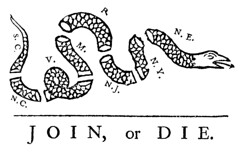AMSCO United States History 2015 Edition, Chapter 4 Imperial Wars and Colonial Protest, 1754-1774
| 7236636480 | Patrick Henry | Young Virginian lawyer who coined the phrase "No taxation without representation" in his speech to the House of Burgesses. (p. 73) |  | 0 |
| 7236636481 | Stamp Act Congress | Representatives from nine colonies met in New York in 1765 and decided that only their own elected representatives had the power to approve taxes. (p. 73) |  | 1 |
| 7236636482 | Sons and Daughters of Liberty | Secret society organized to intimidated tax agents. Sometimes they destroyed revenue stamps and tarred and feathered tax collectors. (p. 73) |  | 2 |
| 7236636483 | John Dickinson; Letters from a Farmer in Pennsylvania | In 1767 and 1768, he argued that the idea of no taxation without representation, was an essential principle of English law. (p. 74) |  | 3 |
| 7236636484 | Samuel Adams | In 1768, he was one of the authors of the the Massachusetts Circular Letter which urged colonies to petition Parliament to repeal the Townshend Acts. (p. 74) |  | 4 |
| 7236636486 | Massachusetts Circular Letter | In 1768, this document was distributed to every colonial legislature. It urged the colonies to petition Parliament to repeal the Townshend Acts. (p. 74) |  | 5 |
| 7236636487 | Committees of Correspondence | Initiated by Samuel Adams in 1772, these letters spread news of suspicious or threatening acts by the British throughout the colonies. (p. 74) |  | 6 |
| 7236636488 | Intolerable Acts | Colonist nickname for the Coercive Acts of 1774, a series of acts created to punish the colonists for the Boston Tea Party. (p. 75) |  | 7 |
| 7236636489 | George III | In the 1760s, he was the King of England. (p. 71) |  | 8 |
| 7236636491 | Parliament | The legislative house of Great Britain. (p. 71) |  | 9 |
| 7236636492 | salutary neglect | Great Britain had exercised little direct control over the colonies and did not enforce its navigation laws. This changed after the French and Indian War, as the British adopted more forceful policies for taking control of the colonies. (p. 71) |  | 10 |
| 7236636494 | Pontiac's Rebellion | In 1763, American Indian chief Pontiac led a major attack against the colonial settlements on the western frontier. The British did not rely on colonial forces, but instead sent their army to deal with the rebellion. This led to the creation of the Proclamation of 1763. (p. 72) |  | 11 |
| 7236636495 | Proclamation Act of 1763 | This proclamation prohibited colonists from settling west of the Appalachian Mountains. The British hoped it would prevent violence between Native Americans and colonists. The colonists were angry and disobeyed the law, moving to the west of the imaginary boundary in large numbers. (p. 72) |  | 12 |
| 7236636496 | Seven Years' War (French and Indian War) | War fought in the colonies from 1754 to 1763 between the English and the French for possession of the Ohio River Valley area. The English won the war and the Peace of Paris was negotiated in 1763. (p. 70) |  | 13 |
| 7236636497 | Albany Plan of Union | The British government called for representatives from several colonies to meet in Albany, New York in 1754, to provide for an inter-colonial government to recruit troops and collect taxes. Each colony was too jealous of its own taxation powers to accept the plan. (p. 70) |  | 14 |
| 7236636498 | Edward Braddock | In 1755, this general led an army from colonial Virginia, to attack the French near Ft. Duquesne. More than 2,000 of his British and colonial troops were defeated by a smaller force of French and American Indians. (p. 70) |  | 15 |
| 7236636499 | George Washington | He led a small militia from the Virginia colony, to halt the completion of the French fort in the Ohio River Valley, Fort Duquesne. In July 1974, he was forced to surrender to a superior force of Frenchmen and their American Indian allies. This was the beginning of the French and Indian War. (p. 70) |  | 16 |
| 7236636500 | Peace of Paris | Peace treaty signed to end the French and Indian War (The Seven Years' War) in 1763. Great Britain gained French Canada and Spanish Florida. France gave Spain its western territory. (p. 71) |  | 17 |
| 7236636501 | Sugar Act | A 1764 British act which placed duties on foreign sugar and other luxuries. Its primary purpose was to raise money for the English Crown. (p. 72) |  | 18 |
| 7236636502 | Quartering Act | This 1765 act required the colonists to provide food and living quarters for British soldiers. (p. 72) |  | 19 |
| 7236636503 | Stamp Act | This 1765 act required that revenue stamps be placed on almost all printed paper, such as legal documents, newspapers, and pamphlets. This was the first tax paid directly by the colonists, rather than merchants. Boycotts were effective in repealing this act. (p. 72) |  | 20 |
| 7236636504 | Declaratory Act | In 1766, Parliament declared that it had the right to tax and make laws for the colonies in all cases whatsoever. (p. 73) |  | 21 |
| 7236636505 | Townshend Acts | In 1767, Parliament enacted new taxes to be collected on imports of tea, glass, and paper. It also created the writs of assistance, which was a general license to search for smuggled goods anywhere. (p. 73) |  | 22 |
| 7236636506 | Writs of Assistance | A general license to search anywhere for smuggled goods without a warrant for a specific property. (p. 73) |  | 23 |
| 7236636507 | Tea Act | In 1773, Parliament passed this act which taxed imported tea. The result was that British tea was even cheaper than smuggled Dutch tea. Colonists responded with the Boston Tea Party because they still felt this was taxation without representation. (p. 75) |  | 24 |
| 7236636508 | Coercive Acts | In 1774, after the Boston Tea Party, Great Britain created four Coercive Acts to punish the people of Boston and Massachusetts. They closed the port of Boston until the spilled tea was paid for, reduced the power of the Massachusetts legislature, and forced those accused of crimes to be tried in England. (p. 75) |  | 25 |
| 7236636514 | Deism | Believe that God established natural laws in creating the universe, but that the role of divine intervention in human affairs was minimal. It influenced American Revolutionary thinkers such as Washington and Jefferson. (p. 77) |  | 26 |
| 7236636516 | John Locke | English philosopher who said that all people have rights, simply because they are human and that people have a right and a responsibility to revolt against any government that failed to protect their rights. (p. 77) |  | 27 |
| 7236654228 | Boston Tea Party | In 1773, a group of Bostonians disguised themselves as American Indians and dumped chests of tea into the harbor. The British responded with the Coercive (Intolerable) Acts in 1774. (p.75) |  | 28 |

